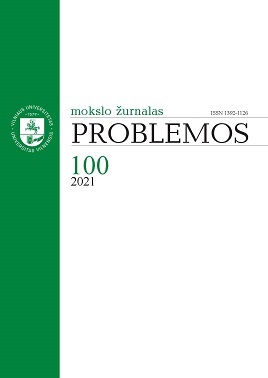Jacques’o Lacano pertrūkio teorija: tikrovės perspektyva
Jacques Lacan’s Theory of Rupture: the Perspective of the Real
Author(s): Kasparas PociusSubject(s): Epistemology, Ethics / Practical Philosophy, Contemporary Philosophy, Structuralism and Post-Structuralism
Published by: Vilniaus Universiteto Leidykla
Keywords: Lacan; subject; the Real; fantasy; phallic signifier;
Summary/Abstract: The article analyses Jacques Lacan’s theory of rupture that encompasses the three planes – the imaginary, the Symbolic and the Real – that comprise his topology. It is named the theory of rupture because it allows grasping the unfinished Lacanian subject as it encounters Other in all of those planes. The main question is whether this lack could be considered as positive. The attention is paid to the phallic signifier; the hypothesis is that this signifier, by linking the symbolic and the Real, allows the creation of new meanings and the resistance towards the fundamental fantasy. The Lacanian ternary conception of topology helps us to analyse the field of politics. While grasping this field from the “ex-sisting” perspective of the Real, we can observe the two scenarios of the development of (political) subject. On the one hand, there is a possible link between the subject and fantasy, in which one tries to compensate for the lack of the Real by “comforting” itself in the plane of symbolic discourse. On the other hand, in the alternative scenario, the subject consciously admits its lack, rejects the fantasy and begins to create new names which “hole” the symbolic discourse itself as well as the insufficiency of the symbolic field. The Real is defended by the phallic signifier, which helps to maintain the subject’s negativity and militancy. By enclosing the Real into the Symbolic we create the new consistency as the subject seeks not to maintain a passive form and place inside the structure, but names the positive lack in the structure itself and thereby creates the new political content.
Journal: Problemos
- Issue Year: 2021
- Issue No: 100
- Page Range: 100-113
- Page Count: 14
- Language: Lithuanian

